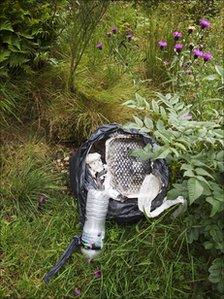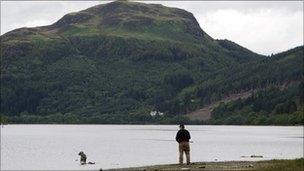National park may extend Loch Lomond crackdown
- Published

Bags of rubbish are often discarded at popular spots
The "success" of a camping and alcohol ban on east Loch Lomond is to be used as a model to tackle problems elsewhere in the national park.
Laws designed to deal with the effects of "irresponsible camping" are in force along a nine-mile stretch of the loch.
The National Park Authority is now looking for "solutions" to similar issues around the five lochs of Voil, Earn, Lubnaig, Venachar and Achray.
Anglers are one of the groups being targeted, as well as lochside campers.
Police said in some cases anglers were bringing chainsaws to cut down trees to use as firewood.
Loch Lomond and the Trossachs National Park has formed a "Five Lochs" partnership comprising police, community councils and landowners.
It has already met once and will convene again in October to discuss how to clamp down on anti-social behaviour and environmental damage at the lochs.
Seasonal camping by-laws and an alcohol ban were introduced between Drymen and Rowardennan in June after the measures were approved by the Scottish government.
Ch Insp Kevin Findlater, who represents Central Scotland Police and Tayside Police in the Five Lochs group, said the laws had transformed the "disgraceful" state of the lochside.
He told BBC Scotland that it was time to turn attention to other lochs, with anglers being the largest groups in some areas.
"The majority are families trying to enjoy themselves and there are one or two tents with individuals drinking and causing the problems," he said.

Anglers are one of the groups being targeted by the National Park Authority
"Whereas the people on Loch Lomond are trying to hack down trees with wire saws, some of these fisherman are turning up with chainsaws. They're more organised.
"There was even one with a lawnmower which was used to prepare the area for his tent. This was in a farmer's field."
Other issues include littering, fires and cars blocking roads, he said.
The chief inspector, who has policed the Loch Lomond area for almost 30 years, said this sort of behaviour led landowners to "question" the access rights enshrined in the 2003 Land Reform Act.
He would not speculate on the measures that could be introduced to control the problems, but added: "The Land Reform Act does not give rights to fish or hunt."
Loch 'hotspots'
Grant Moir, head of conservation at the national park, said anglers were not the only group being targeted by the park.
"It's more looking at what the management issues are around the lochs - some are fishing, some are camping," he said.
"It's not as concentrated as east Loch Lomond but we have some hotspots, for example Loch Lubnaig.
"We're trying to take some of the things that have worked in east Loch Lomond and see what we can do in other areas. It's the same model."
Mr Moir denied the park were attempting to drive people away and said the Loch Lomond by-laws were actually encouraging people to return to the area.
The Scottish Anglers National Association told the BBC it welcomed the Five Lochs project, saying "sensible" management was needed to stop the "bad practices" of some anglers.
But others have expressed concern at this latest move by the authority to control how people are using the park.
Outdoors writer Peter Macfarlane argued that the Lomond camping ban was not working, with rangers simply picking "easy targets".
"I've seen a ranger move on a young French couple who were hiking and then ignore the huge family tent with people drinking outside camped in the ban area," he said.
"I've got no problem with them policing it properly. There's a local community on east Loch Lomond, people live there. But the rest of the park is more sparsely populated - they can just go and deal with it.
"It's going to give the impression to the public that it's some kind of policed, closed community. It's the wrong way to go about it."
- Published5 September 2011
- Published9 March 2011
- Published13 December 2010
- Published24 June 2010
- Published24 May 2010